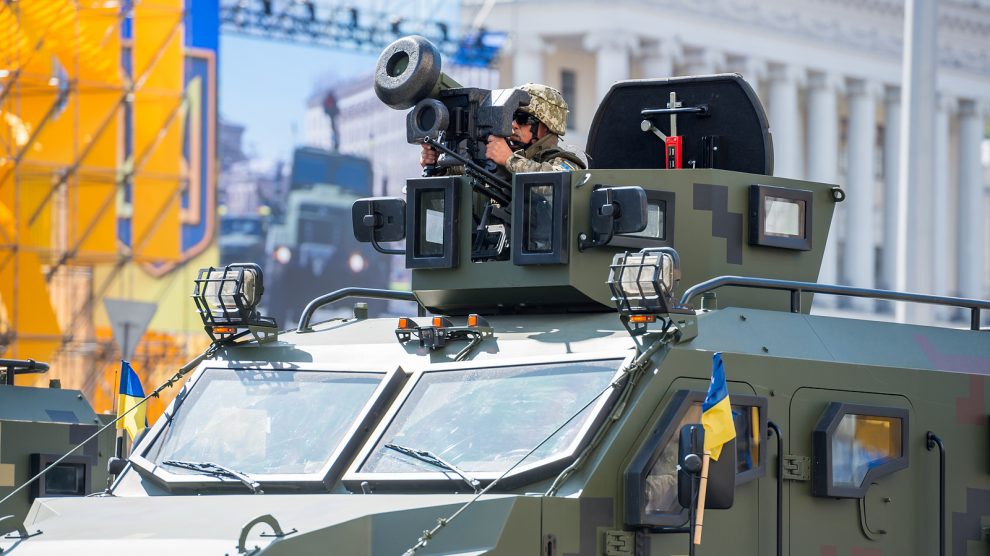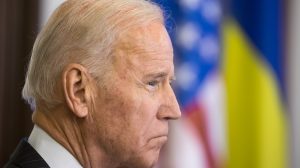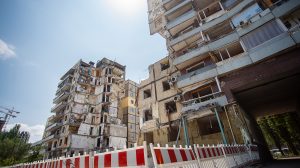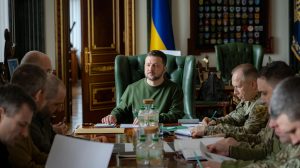You can read all of our coverage of Russia’s invasion of Ukraine, including explainers and articles offering context and background information here.
Russia’s invasion of Ukraine
The war in Ukraine entered its fourth week on Thursday with Kyiv launching a series of small-scale counter attacks against Russia’s struggling armed forces who have failed to make any significant territorial gains since their invasion began on February 24.
The weakness of Russia’s forces led the Ukrainian president, Volodymyr Zelensky, to say that there was room for compromise in peace talks with Moscow, and that the Russian delegation’s positions were becoming increasingly “realistic”.
Zelensky on Tuesday dropped his clearest hint yet that he does not expect his country to join NATO anytime soon. “For years we have been hearing about how the door is supposedly open but now we hear that we cannot enter. And it is true, and it must be acknowledged,” he said.
Russia’s army retains its capability to shell Ukrainian towns and cities, however, and it this week stepped up its campaign of terror against the Black Sea port of Mariupol. Although several thousand residents managed to leave the city this week, round 350,000 people remain trapped and at least as 2,500 civilians have died, Ukrainian officials estimate. Those who remain are without electricity, water and heat.
The Ukrainian capital Kyiv, where the situation is calm, despite sporadic shelling, was on Tuesday visited by the prime ministers of Czechia, Poland, and Slovenia, who travelled by train to meet with Zelensky and members of the Ukrainian government. Czech Prime Minister Petr Fiala said the “main goal” of the visit to Kyiv was to tell Ukrainians they are “not alone” in their fight against the Russian invasion.
Zelensky on Wednesday delivered a rare wartime speech to the US Congress in a fresh call for a no-fly zone and help acquiring fighter jets. US President Joe Biden has so far rejected such calls, fearing that they could drag the US into conflict with Russia. Biden did however this week announce an additional 800 million US dollars in security assistance to Ukraine. This includes armed drones, anti-aircraft and anti-armour systems, small arms (machine guns, shotguns), and 20 million rounds of ammunition.
Should Russia continue its war against Ukraine, a protracted conflict risks dragging almost one third of Ukraine’s 44 million people below the poverty line, the United Nations Development Programme (UNDP) warned on Wednesday, adding that a further 62 per cent would be at risk of also falling into poverty within a year.
It follows a warning from the International Monetary Fund (IMF) that Ukraine’s economy could shrink by up to 35 per cent this year if Russia’s invasion becomes a protracted conflict, and the UN’s Food and Agriculture Organisation’s assessment that the conflict will further undercut the purchasing power of Ukraine’s population, with consequent increases in food insecurity and malnutrition.
The number of people who have so far fled Ukraine since the invasion began has now topped three million, with an additional 1.85 million internally displaced people inside Ukraine.
Other news
Former Bulgarian Prime Minister Boyko Borissov was arrested on Thursday in connection with 120 cases of misuse of European Union funds. Several other members of Borissov’s GERB party were also arrested, among them Vladislav Goranov, a former finance minister. The arrests came just a day after the European Union’s chief prosecutor, Laura Kövesi, visited Bulgaria to meet with current PM Kiril Petkov. “Nobody is above the law,” said Petkov in response to the arrests. Borissov served as the prime minister of Bulgaria from 2009 to 2013, 2014 to 2017, and 2017 to 2021.
The European Union’s foreign policy chief on Monday reaffirmed the 27-country bloc’s desire to integrate the Western Balkans, saying it’s a “strategic priority.” Josep Borrell said Brussels is committed to making the “EU perspective a reality” for the region. “This is the moment to reinvigorate the enlargement process and to anchor the Western Balkans firmly to the EU,” Borrell said following talks in North Macedonia with the country’s prime minister, Dimitar Kovachevski.
Georgia cannot behave like a NATO member state as part of its territory is occupied by Russia, the country’s head of state told Euronews this week. “Georgia, having part of the territory occupied, being on the frontline, does not exactly behave as a country that is a member of NATO and is protected in many different ways,” said President Salome Zourabichvili. Ukrainian President Volodymyr Zelensky withdrew his ambassador from Georgia in early March over what he said was an “immoral attitude” towards sanctions.
Railways ground to a halt in many places across Poland on Thursday, disrupting an important means of transport for Ukrainian refugees after what the transport minister said was a traffic control system outage impacting several countries. Infrastructure Minister Andrzej Adamczyk said that identical faults in the traffic control systems, which are produced by a unit of French train maker Alstom , had also appeared in India, Singapore and possibly Pakistan.
Armenian Foreign Minister Ararat Mirzoyan has said his country is ready to establish diplomatic relations and open its border with Turkey, the Turkish state-owned Anadolu news agency reported on Tuesday. “Armenia is ready to establish diplomatic relations and open borders with Turkey,” Anadolu quoted Mirzoyan as saying in an interview given last week. “I am glad to hear from my Turkish colleague that there is the political will to lead the process towards that goal.”
The son of Turkmenistan’s autocrat leader, Gurbanguly Berdymukhamedov, has won a decisive victory in the presidential election, officials have said, paving the way for hereditary succession in one of the world’s most tightly controlled countries. Serdar Berdymukhamedov, 40, won the ballot held last Saturday with 73 per cent of the vote, the Central Electoral Commission (CEC) said on its website.
Unlike many news and information platforms, Emerging Europe is free to read, and always will be. There is no paywall here. We are independent, not affiliated with nor representing any political party or business organisation. We want the very best for emerging Europe, nothing more, nothing less. Your support will help us continue to spread the word about this amazing region.
You can contribute here. Thank you.








Add Comment